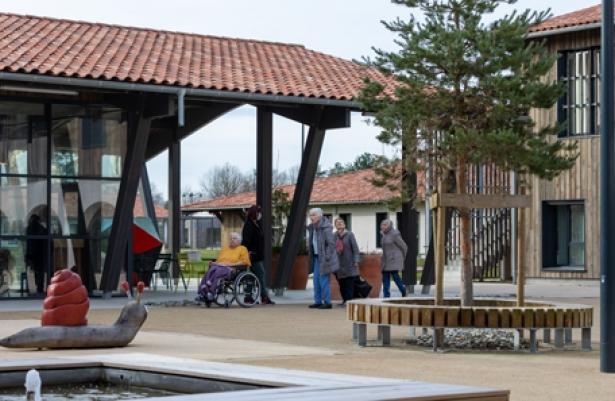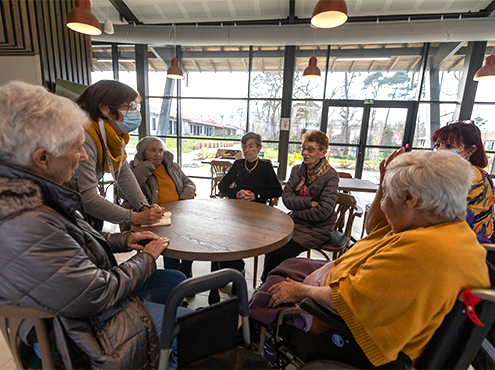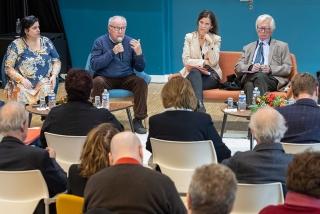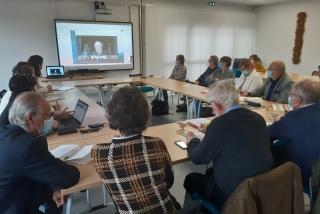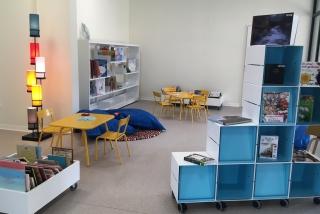Under the administrative aegis of the Maison des Sciences de l'Homme d'Aquitaine (MSHA), INNOV'PAD aims to analyze and compare the various modes of reception, support and care that exist by studying old age care models: from traditional nursing homes to home help, including initiatives seeking to renew institutional care, such as the Village Landais Alzheimer.
The Village under the scrutiny of researchers
The team is made up of two teacher-researchers from Bordeaux-Montaigne University, Marie-Laure Pouchadon and Florence Zerillo, and Philippe Martin, research director at CNRS, COMPTRASEC- University of Bordeaux. Their complementary profiles have drawn the contours of their research. Marie-Laure Pouchadon, sociologist, and Philippe Martin, jurist, had previously conducted a study for Mire-Drees on the appropriation of the national policy of support for autonomy by the departmental councils and, more particularly, on the implementation implementation of local social policies aimed at dependent elderly people and disabled people. Florence Zerillo, psychologist, had, for her part, questioned within the framework of a national research program (ANR PAGODE), the taking into account of aging and the elderly population in the reflection accompanying the construction of the sustainable city through eco-districts.
INNOV’PAD is the response to the 2019 “Research” call for projects from the Nouvelle-Aquitaine Regional Council, which resulted in several months of observation within the Landais Alzheimer Village. "Our study is interested in the effects of these innovations on the people received and on their families, that is to say on daily life with the disease, on the evolution of their social relations, on the relationship with space and places, as well as professional practices by observing, among other things, forms of professional cooperation ”, explains Florence Zerillo.
In immersion
Complementing the study carried out by INSERM, the INNOV'PAD research proposes a qualitative approach: semi-structured interviews are carried out on site or remotely with the various project stakeholders (designers, Village employees and management team, families and volunteers). For professionals, a call for testimonials has also been launched. Group discussions will complement the individual interviews. Organized around specific lines of thought related to the central issue of the study, they will make it possible to question the analysis and create a framework for exchange between practitioners.
To determine the impact of the establishment's spaces and the way they are "experienced", the two researchers will sit in the media library, on the terrace of the brewery, on one of the benches in the landscaped park, etc., to observe : "What are the places of life, those of passage, those of meeting? How are these places invested and what do they produce in terms of interactions? What do they bring to patients, their families or professionals? "
Fieldwork that will be completed by their colleague in charge of legal issues. Philippe Martin, for his part, will analyze the way in which these social innovations are co-constructed and supported by public policies. "At the end of the research, the different support models studied will be compared in order to better understand the reality of the innovative practices proposed, to grasp their strengths and weaknesses both from the point of view of well-being and taking care of patients, the intervention of professionals, as well as the space offered to families, relatives and volunteers. », specify the two researchers.
The INNOV'PAD study will not be finalized before 2023. "These are studies which have a long time frame but their results must be concrete: research feeds on practice and ultimately research must feed practice", conclude the teacher-researchers. "Being in the field of social careers, we must also imagine the means to widely and better share the results of research with professionals, so that they can appropriate them and question them."
